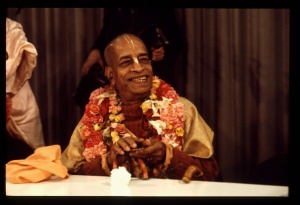SB 6.11.2-3

A.C. Bhaktivedanta Swami Prabhupada
TEXTS 2-3
- viśīryamāṇāṁ pṛtanām
- āsurīm asurarṣabhaḥ
- kālānukūlais tridaśaiḥ
- kālyamānām anāthavat
- dṛṣṭvātapyata saṅkruddha
- indra-śatrur amarṣitaḥ
- tān nivāryaujasā rājan
- nirbhartsyedam uvāca ha
SYNONYMS
viśīryamāṇām—being shattered; pṛtanām—the army; āsurīm—of the demons; asura-ṛṣabhaḥ—the best of the asuras, Vṛtrāsura; kāla-anukūlaiḥ—following the circumstances presented by time; tridaśaiḥ—by the demigods; kālyamānām—being chased; anātha-vat—as if no one were there to protect them; dṛṣṭvā—seeing; atapyata—felt pain; saṅkruddhaḥ—being very angry; indra-śatruḥ—Vṛtrāsura, the enemy of Indra; amarṣitaḥ—unable to tolerate; tān—them (the demigods); nivārya—blocking; ojasā—with great force; rājan—O King Parīkṣit; nirbhartsya—rebuking; idam—this; uvāca—said; ha—indeed.
TRANSLATION
O King Parīkṣit, the demigods, taking advantage of a favorable opportunity presented by time, attacked the army of the demons from the rear and began driving away the demoniac soldiers, scattering them here and there as if their army had no leader. Seeing the pitiable condition of his soldiers, Vṛtrāsura, the best of the asuras, who was called Indraśatru, the enemy of Indra, was very much aggrieved. Unable to tolerate such reverses, he stopped and forcefully rebuked the demigods, speaking the following words in an angry mood.